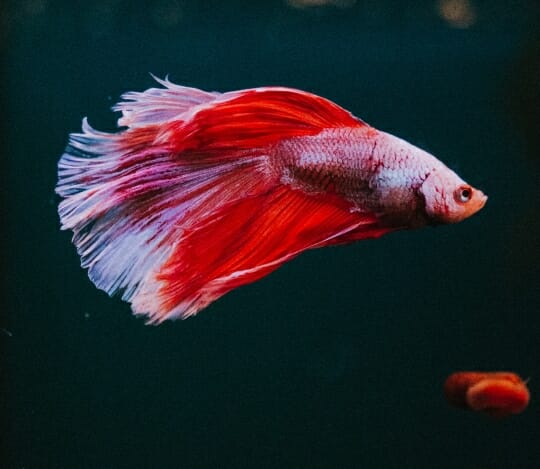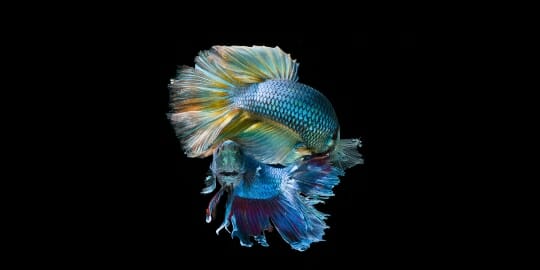What Does It Mean When a Betta Fish Flares Its Gills at You?

Betta fish are among the most popular fish globally and well! They are beautiful, easy to care for, and perfect for beginners. Betta fish are considered one of the most accessible fish to care for. They are active and playful and make great additions to any aquarium, but sometimes, you may notice an unusual behavior when a betta fish flares its gills on you.
When a betta fish flares its gills at you, it warns you to back away. It can be seen as a sign of aggression or warning and usually indicates that the fish feels threatened or angry. In some cases, it may also respond to being placed in an unfamiliar or uncomfortable environment.
Table of Contents
Most Common Reasons Why Betta Fish Flares Its Gills
There can be several reasons why your betta fish might flare its gills at you. Some possible causes could include feeling threatened, angry, or uncomfortable in its new surroundings.
Defending Territory
Betta fish may flare their gills when defending territory. In addition, they may also attempt to protect themselves from being taken away. Betta fish can flare their gills when humans, and other animals, especially dogs, come close to them. The behavior usually indicates that the betta is worried about possible human aggression towards it for whatever reason (including mistreatment). However, do not be surprised if this happens in a new home where pets have never lived. In some cases, the fish may become aggressive if it feels its space is being invaded or threatened.
Stretching
Some betta fish may flare their gills as a response to the contracting action of swimming, known as “stretching.” Betta fish tend to contract their bodies when they swim, causing their scales to ripple and shimmer. When a betta sees another fish in its territory or attempting to consume any of its food, it may enact this defensive behavior by quickly flaring its gills. In addition, they sometimes flare their gills when they are swimming to prevent any foreign objects from getting stuck in them.
Boredom Breaker
Betta fish may also flare their gills when they are feeling bored. If left alone in a small space, some betta fish will use the display to show that they are active and have things to do. Because of their current popularity as pets, some people believe that any movement from a betta fish means “happy” and therefore feed them every two hours to keep the water clean. For instance, if a person finds that their bettas are not swimming or eating, they might substitute feeding time with pouring pellets into each tank instead. This constant flow can become tiring for all bettas in one’s household; thus, they may flare their gills to show how bored they are with the situation. Changing habits like this can cause a betta fish to flare its gills to draw attention and get fed again!
Flirting
Sometimes, betta fish will flare their gills to attract the attention of their owners or fellow tank mates. This is known as “flirting.” Noticeable flaring of the gills may be accompanied by a display of courtship behavior such as circles, weaving, and darting around. In addition to this, males may also flare their gills when a female is courting them. The fish will try and mate with the first one that shows itself. Females do not always choose a male based on whether his gill flares are big or small! Flaring your bettas’ fins doesn’t necessarily mean they want to go swimming – it just means they need more attention.
Own Reflection
Some betta fish may display aggressive flaring behavior when they see their reflection in a glass. This is often seen as a sign of aggression or dominance and can indicate that the fish feels threatened or uncomfortable.
Natural Behavior
Some betta fish may flare their gills as a natural behavior. This includes some varieties of betta that originate from water environments where fighting is expected. Additionally, some betta fish in the wild will flare their gills to ward off potential predators or competitors.

Why Are Betta Fish Aggressive?
There is no one answer to this question as the origin of aggressive flaring behavior can vary depending on the individual fish and what is triggering the display. Some theories suggest that it may respond to stress or fear, while others believe it may be an instinctual attempt to intimidate or scare away potential threats. In addition, female fish will flare their gills and threaten other females when a male has been selected as the potential mate.
Is Flaring Bad for Their Health?
There is no definitive answer to this question. The health effects of aggressive behavior displayed by betta fish may vary depending on the individual fish and their type of display. For example, some people believe that aggressive displays can lead to physical injury or even death in some cases, but there is limited scientific evidence to support this claim.
Do Female Bettas Flare or Only Males?
Some experts believe that females may be more likely than males to display aggressive flaring behavior because they are often more territorial. Additionally, female bettas are a little more sensitive around their eggs than males, as they tend to keep them close by at all times. On the other hand, Male bettas often have trouble maintaining tight positions, which can cause them to feel territorial or aggressive towards one another.
How to Stop a Betta Flaring Too Much?
There is no one answer to this question as the origin of aggressive flaring behavior can vary depending on the individual fish and what is triggering the display. So, for example, if you are noticing your betta fish displaying aggressive flaring behavior more often, there are some tips you can follow to try to stop the behavior.
- Provide a comfortable environment: One of the most important things you can do to try and stop your betta fish from flare-up is to make sure their tank is well-lit and has plenty of hiding spots. Additionally, make sure their food and water dishes are clean and fresh so they don’t feel stressed.
- Avoid sudden movements or loud noises: If your fish is displaying aggressive flaring behavior, be gentle when trying to handle them – avoid sudden movements or loud noises if possible.
- Consult a veterinarian: If none of the tips above seem to be working, it may be a good idea to consult with a veterinarian who can help address the underlying cause of the problem and support advice on how to best your betta fish relax and calm down.